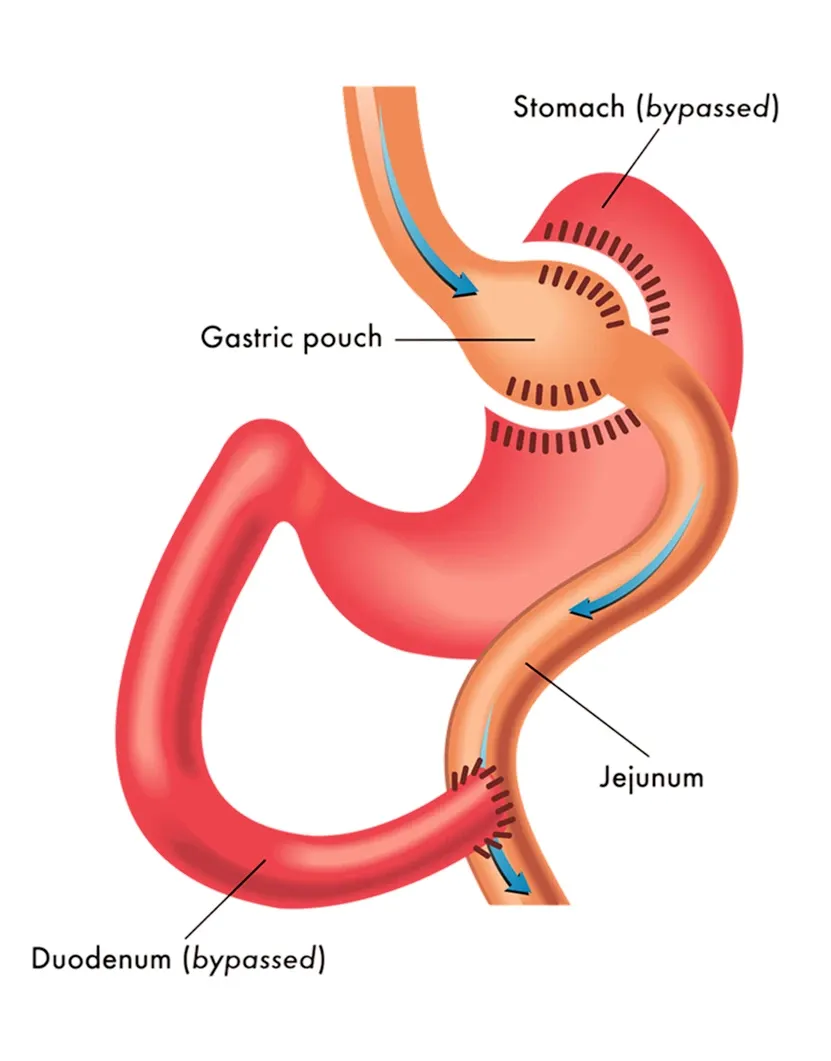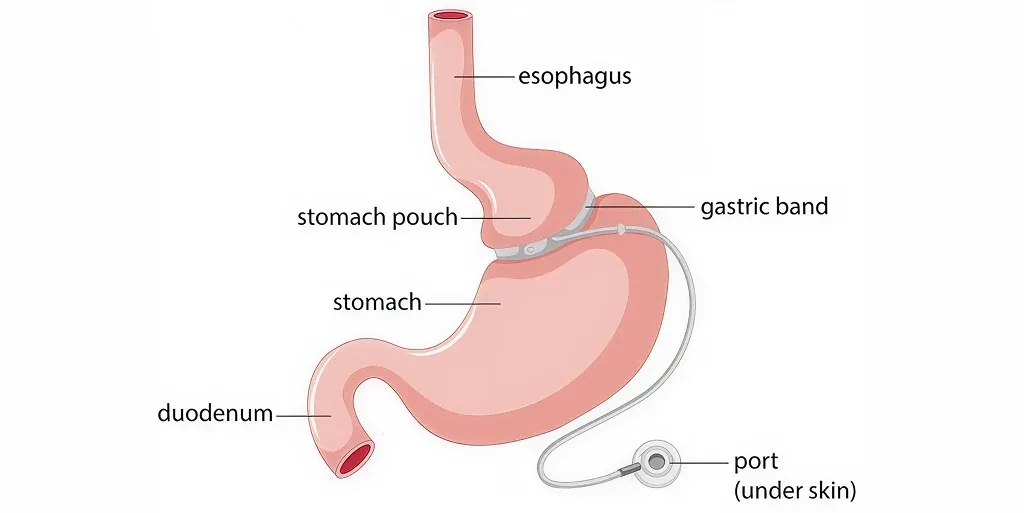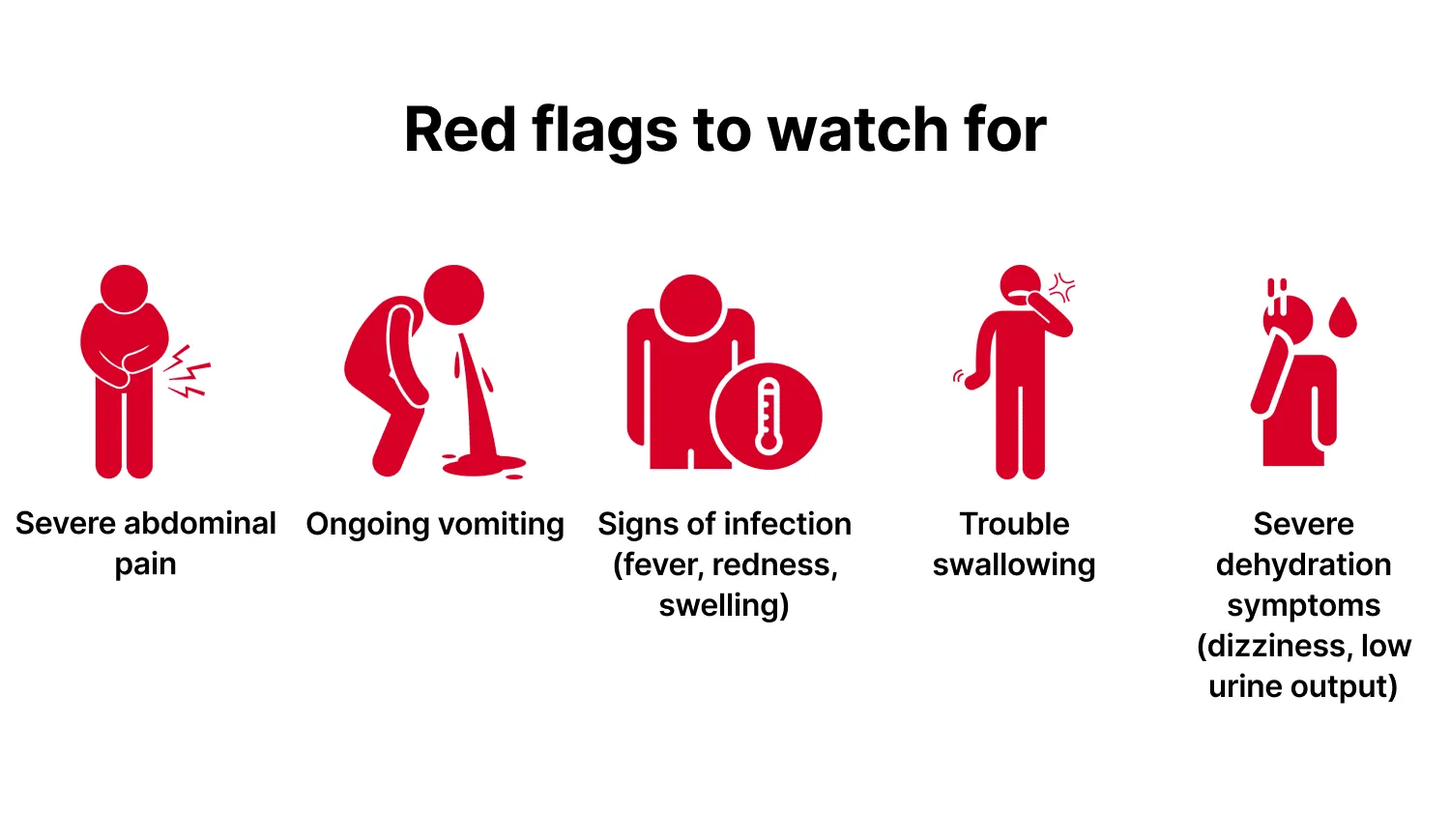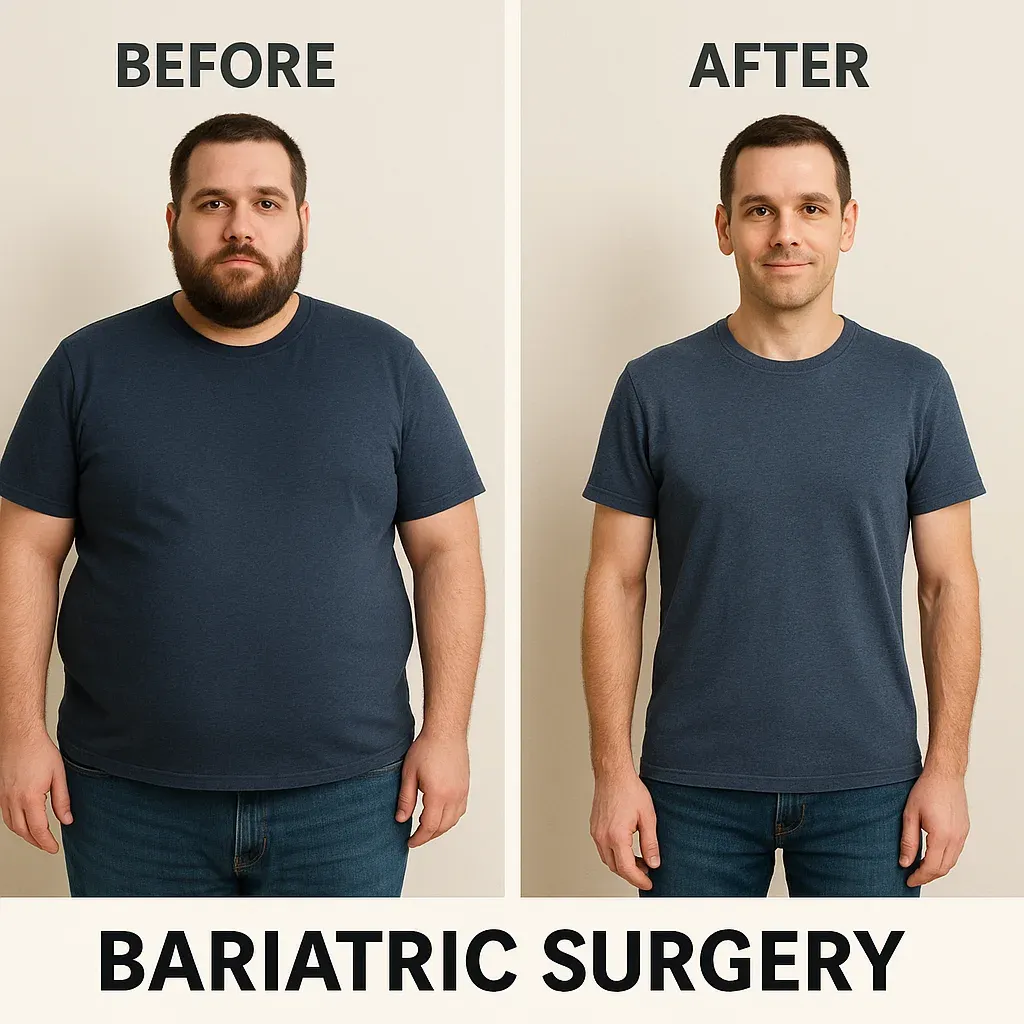Bariatric Surgery in Turkey: Your Complete Guide to Weight Loss Surgery

Struggling with weight can feel overwhelming, especially when nothing seems to work. You’ve tried diets, exercise plans, and maybe even medications, but the results don’t last. And when you finally consider surgery, the cost in your country is shockingly high.
It’s frustrating, disheartening, and unfair. You know bariatric surgery could change your life, helping you lose weight, reverse health problems like diabetes or sleep apnea, and feel confident again. But between the high price tag, long wait times, and confusing options, it’s hard to know where to turn.
That’s where Turkey comes in. With world-class hospitals, experienced surgeons, and affordable, all-inclusive packages, Turkey has become one of the top destinations for safe, effective weight loss surgery.
In this guide, you’ll discover everything you need to know about bariatric surgery in Turkey—from prices and procedure types to clinics, care packages, and what to expect before and after.
How much does bariatric surgery cost in Turkey?
If you're thinking about getting bariatric surgery in Turkey, one of the first things you'll want to know is: how much will it cost? You're not alone. Price is one of the biggest factors for anyone considering weight loss surgery abroad.
In Turkey, most procedures, like the gastric sleeve or bypass, cost between $3,500 and $8,000. That’s a fraction of what you’d pay in the US, UK, or other Western countries. And you’re not sacrificing quality—many Turkish hospitals are internationally accredited.
Average bariatric surgery costs by country
| Country | Average Cost of Bariatric Surgery (USD) |
|---|---|
| Turkey | $3,500 – $8,000 |
| US | $20,000 – $25,000 |
| UK | £8,000 – £10,000 (~$10,000 – $12,500) |
| Australia | AUD 12,000 – 20,000 (~$8,000 – $13,000) |
| Germany | €12,000 – €15,000 (~$13,000 – $16,000) |
Cost of different bariatric procedures in Turkey
Here's a quick snapshot of what you might expect to pay for each type of bariatric surgery in Turkey:
| Procedure | Cost Range (USD) |
|---|---|
| Gastric Sleeve (Sleeve Gastrectomy) | $4,000 - $6,700 |
| Gastric Bypass (Roux-en-Y) | $4,800 - $7,000 |
| Mini Gastric Bypass (OAGB) | $4,000 - $6,500 |
| Adjustable Gastric Banding | $1,500 - $5,000 |
| Gastric Balloon | $1,200 - $4,500 |

Most clinics offer all-inclusive packages. Here’s what you usually get:
-
Surgery by a top bariatric surgeon
-
Hospital stay (2–4 nights)
-
Pre-op tests and anesthesia
-
Airport pickup and transfers
-
Hotel accommodation
-
Post-op care and follow-up
Insurance and payment options
Heads up: Most international insurance plans won’t cover bariatric surgery in Turkey unless it’s an emergency. But clinics often offer payment plans or accept credit cards, making things easier for you.
Additional costs to consider
Don’t forget to add costs of:
-
Flights to Turkey
-
Extra nights at the hotel (if needed)
-
Medications or supplements after surgery
-
Optional tourist activities if you’re extending your stay
Wondering how much your weight loss surgery will cost? Get a personalized cost estimate from QCG today.
Types of bariatric surgery offered in Turkey
Bariatric surgery, often called weight loss surgery, helps you shed excess weight by changing how your digestive system works.
Think of it as giving your stomach and intestines a makeover. It shrinks your stomach, limits how much you can eat, and sometimes even reduces how many calories and nutrients your body absorbs.
But it’s not just about dropping pounds or fitting into old jeans. It’s a legit, medically-approved treatment for severe obesity and obesity-related health problems, like high blood pressure, type 2 diabetes, sleep apnea, and joint pain.
There are several types of bariatric surgery, and your doctor will help you decide the best option based on your overall health and weight loss goals.
Let’s take a closer look at the most popular procedures available in Turkey:
Gastric sleeve surgery (Sleeve gastrectomy)

This is currently the most popular bariatric procedure worldwide. During sleeve gastrectomy, your surgeon removes about 80% of your stomach, leaving behind a small, banana-shaped "sleeve."
As a result, your smaller stomach holds much less food, and you feel full after eating small portions. Since it removes the part of your stomach that makes ghrelin (the hunger hormone), most people feel less hungry overall.
The gastric sleeve has become a favorite because it's relatively simple and doesn't involve rerouting your intestines. Most people lose 60-70% of their excess weight within the first two years after sleeve gastrectomy.
Ready to take the first step? Don’t miss our exclusive deals on gastric sleeve surgery in Turkey.
Gastric bypass surgery (Roux-en-Y gastric bypass)

Gastric bypass is like the veteran of weight loss surgeries – it's been around longer and has tons of research backing its effectiveness. This procedure is a bit more complex than the sleeve.
During gastric bypass surgery, your surgeon creates a small pouch from your stomach and reroutes your small intestine. It bypasses most of your stomach and the first part of your small intestine. This limits how much you can eat and reduces nutrient absorption.
Most people lose 70-80% of their excess weight with a gastric bypass. It's particularly effective for people with diabetes, often leading to remission of the condition.
While gastric bypass in Turkey is mostly done laparoscopically, some top clinics now offer robotic-assisted surgery, which may provide more precision and quicker recovery.
Thinking long-term? Check out our top-value gastric bypass package—designed for lasting results.
Mini gastric bypass (One anastomosis gastric bypass)

Think of this as gastric bypass's younger, simpler sibling. It achieves similar results but with a less complex procedure.
The surgeon creates a long, narrow stomach pouch and connects it directly to the small intestine. One connection instead of two – hence the name.
However, it is a newer procedure with less long-term data. Plus, there is a risk of bile reflux, and it may require conversion to traditional bypass.
Adjustable gastric band surgery

Think of this as putting a belt around the top of your stomach. Your surgeon places an inflatable band that creates a small stomach pouch above the band. It fills up quickly, making you feel full faster.
The cool thing about the band is that it's adjustable. If you need it tighter or looser, your doctor can adjust it during a simple office visit.
However, lap-band surgery has become less popular in recent years due to higher revision rates and slower weight loss compared to other procedures.
Biliopancreatic diversion with duodenal switch (BPD/DS)

This is the most complex bariatric procedure, combining elements of both sleeve gastrectomy and intestinal bypass. It provides significant weight loss but also carries higher risks of deficiencies.
The duodenal switch is typically reserved for people with extremely high BMIs (usually over 50) who need maximum weight loss for health reasons.
Not sure which surgery fits your needs? QCG connects you with top surgeons for personalized recommendations. Get in touch with our coordinator now!
Gastric balloon and gastric botox

Not ready for surgery? These non-surgical options might be perfect for you.
Gastric Balloon: A soft, silicone balloon is placed in your stomach through an endoscope, meaning no cuts, no stitches, no surgery. Once it's in place, it’s filled with saline to occupy space in your stomach, helping you feel full faster and eat smaller portions.
-
Procedure time: 20-30 minutes
-
Stay duration: Day procedure
-
Weight loss: 20-30% of excess weight
-
Duration: 6-12 months
Short-term or steady—our 6-month and 12-month gastric balloon packages offer flexible paths to weight loss.
Gastric Botox: This quick, needle-free procedure involves injecting botulinum toxin (Botox) into specific stomach muscles via endoscopy. The Botox slows stomach emptying and reduces appetite, making you feel full for longer.
-
Procedure time: 15-20 minutes
-
Weight loss: 15-20% of excess weight
-
Duration: 4-6 months
-
Repeatable procedure
[Explore our gastric Botox special package today]
Revisional Bariatric Surgery Options
Sometimes, things don't go as planned with the first surgery. Maybe you didn't lose enough weight, or complications developed. That's where revisional surgery comes in.
Revisional bariatric surgery has emerged as a distinctive entity and can be broadly organized into three categories: corrective, conversion, and reversal surgeries.
Turkish surgeons are experienced in:
-
Converting gastric bands to sleeve or bypass
-
Revising failed sleeves to bypass
-
Correcting complications from previous surgeries
-
Stomach reconstruction procedures
These are more complex procedures requiring specialized expertise. But don't worry! We work with top bariatric surgeons across Turkey who specialize in revisional surgery. Reach out to us—we’ll help you connect with the right clinic.
Eligibility for bariatric surgery in Turkey
Not everyone's a candidate for bariatric surgery. There are specific criteria you need to meet. And Turkish clinics follow strict international guidelines to make sure it’s safe and right for you.
You may be a good candidate if:
-
Your BMI is 40 or higher
-
Your BMI is between 35 and 40, plus obesity-related health problems, like type 2 diabetes, high blood pressure, sleep apnea, joint pain, or heart problems
-
You’ve already tried other weight loss methods (diet, exercise, medications) without long-term success
-
You’re ready to make lifelong changes in your diet, lifestyle, and health habits
-
You have realistic expectations and understand this isn’t a quick fix
Before approval, you’ll also go through evaluations, including:
-
Medical assessments to check your overall health
-
Psychological evaluations to ensure emotional readiness
-
Nutritional consultations to prepare you for life after surgery
Bariatric surgery might not be right if:
-
You're looking for a quick fix
-
You're not ready for major lifestyle changes
-
You have untreated mental health issues
-
You’re unable to commit to long-term follow-up care, including supplements and regular check-ins
How to prepare for bariatric surgery in Turkey?
So, you’ve decided to go for bariatric surgery in Turkey? That’s a huge step. Here’s how to get ready for your journey:
Follow pre-surgery dietary guidelines
You may need to follow a pre-operative diet 1-2 weeks before surgery. This typically involves high-protein, low-carb meals to shrink your liver and make surgery safer.
Also, stop smoking and drinking alcohol at least 3 weeks before weight loss surgery.
Plan travel
Book flights with flexible dates in case surgery gets rescheduled. Many patients arrive 2-3 days before surgery for pre-operative tests and consultations.
Sort your accommodation
Most packages include hotel stays, but if you need to extend, book near the hospital. Areas like Nisantasi in Istanbul or Konyaalti in Antalya are popular with medical tourists.
Pack the essential documents
Keep these handy at all times:
-
Passport (valid for at least 6 months)
-
Medical records and test results
-
Insurance information
-
Emergency contact details
-
List of current medications
Have a detailed consultation
Before surgery, talk to your doctor about your weight loss struggles, ask lots of questions, and take your time making the decision.
Expect thorough pre-operative assessments including blood tests, ECG, chest X-ray, and consultations with the surgeon, anesthesiologist, and nutritionist.
What to expect during bariatric surgery in Turkey
Turkish bariatric surgeons predominantly use laparoscopic (keyhole) techniques. This means:
-
Smaller incisions
-
Less scarring
-
Faster recovery
-
Lower infection risk
-
Shorter hospital stays
Most procedures are performed using the latest robotic-assisted surgery when appropriate, though traditional laparoscopic techniques are still the gold standard for most bariatric procedures.
Most bariatric procedures last between 1 to 3 hours, depending on the type. You’ll usually stay in the hospital for 2 to 3 nights, and then you’re good to head back to your hotel or recovery stay.
Plan your bariatric surgery abroad with confidence. Our care team will handle travel, hotels, and appointments—so you can focus on recovery.
Aftercare & recovery process
Recovery doesn't end when you leave the hospital. In fact, the first few months are important for establishing new eating habits and lifestyle patterns.
Here’s what to expect after your weight loss surgery:
Post-op diet timeline
Your stomach needs time to heal. So, your diet will change in stages:
-
Week 1-2: Clear liquids only
-
Week 3-4: Full liquids and pureed foods
-
Week 5-8: Soft foods
-
Month 3+: Gradual return to regular foods (with some restrictions)
You’ll also need to take vitamin and mineral supplements for life—this helps prevent nutritional deficiencies.
Exercise and activity
Start walking as soon as you’re up to it, even in the hospital. Most people ease back into normal workouts by 6-8 weeks post-op, but always follow your surgeon’s advice.
Monitoring your long-term health
After surgery, regular check-ups are important to keep you healthy and on track. You’ll need:
-
Blood tests to check nutrient levels
-
Weight checks and progress reviews
-
Support for any emotional or psychological changes
Many Turkish clinics offer remote follow-up or work with your local doctor, so your care continues smoothly even after you return home.
Red flags to watch for
Contact your surgeon right away if you notice:
-
Severe abdominal pain
-
Ongoing vomiting
-
Signs of infection (fever, redness, swelling)
-
Trouble swallowing
-
Severe dehydration symptoms (dizziness, low urine output)
Staying in tune with your body and staying connected with your care team helps ensure a smooth and safe recovery.

Benefits of Bariatric Surgery
Thinking about bariatric surgery? It’s not just about weight loss–the benefits go much deeper. Here’s how it can transform your health, body, and mind:
1. Substantial and lasting weight loss
Most patients lose 50-80% of their excess body weight within 12-18 months after surgery, and this weight loss is often maintained for years with proper lifestyle changes.
A 5-year follow-up study evaluated long-term weight loss after gastric sleeve and gastric bypass surgeries. The study found that 80% of patients achieved more than 50% excess weight loss, with mean BMI dropping from 44-46 to around 31 at five years.
2. Improvement or remission of obesity-related diseases
Bariatric surgery doesn’t just help with weight loss; it can significantly improve or even reverse many health conditions linked to obesity.
Here’s a quick look at how it impacts common obesity-related disorders:
Type 2 diabetes
Bariatric surgery can lead to remission or significant improvement in type 2 diabetes. In a study, 1 in 3 patients saw their diabetes go into full remission 10 years after surgery, and 15% had partial remission. Another 2024 NIH study showed that among teens, 55% no longer had diabetes 10 years after surgery.
Hypertension (High blood pressure)
A 5-year study found that over 80% of patients were able to reduce or stop their blood pressure medications after gastric bypass. Even better, nearly 47% achieved full remission of their hypertension.
Sleep apnea
About 65% of people no longer had sleep apnea after bariatric surgery, according to a review of over 2,300 patients. Although it is not always a complete cure since factors like jaw anatomy can also contribute, many people experience better sleep and easier breathing.
Other health benefits
Bariatric surgery also helps reduce the risk of cancer, heart disease, and depressive disorders. Plus, it often improves cholesterol levels and overall metabolic health.
4. Improved mental health and quality of life
Many patients report reduced depression and anxiety, better self-esteem, and greater ability to participate in daily activities and social life after surgery. Quality of life scores, especially for mental health, show marked improvement post-surgery.
5. Increased mobility and physical function
Significant weight loss can make it easier to move, exercise, and perform everyday tasks. This leads to a more active lifestyle and better overall health.
6. Lower mortality and cardiovascular risk
Bariatric surgery is associated with reduced overall mortality and a lower incidence of cardiovascular diseases compared to non-surgical therapy for obesity.

What are the success rates of bariatric procedures?
Bariatric surgery offers impressive weight loss results, but outcomes can vary based on the type of procedure. Here's a quick comparison of the most common options:
| Surgery Type | Excess Weight Loss (EWL) |
|---|---|
| Roux-en-Y Gastric Bypass | 60-80% at 1-5 years |
| Sleeve Gastrectomy | 50-70% within 1 year; up to 80% at 2 years |
| Mini Gastric Bypass (OAGB) | 70-80% at 1-2 years |
| Adjustable Gastric Banding | 30-50% (declines over time) |
What are the risks and complications of bariatric surgery?
Like any major surgery, bariatric procedures carry some risks, both short- and long-term. Here’s what you should know:
1. Surgical complications
Some issues can happen soon after surgery:
-
Anastomotic or staple line leaks. These occur where the surgeon connects or staples parts of the stomach or intestines. Such leaks can lead to infection, sepsis, and require urgent intervention. Watch for warning signs like fever, rapid heart rate, or persistent vomiting.
-
Bleeding and infection are more common but usually manageable.
-
Small bowel obstruction or internal hernias may appear weeks or months later, causing pain, nausea, or vomiting. These often need surgery to fix.
-
Marginal ulcers can develop near the surgical site, causing pain and bleeding, especially in smokers or those taking NSAIDs.
-
Adjustable gastric bands may cause device issues like slippage or erosion, which sometimes require removal.
2. Nutritional deficiencies and malnutrition
Because surgery changes how your body absorbs nutrients, you may become low in:
-
Vitamin B12
-
Iron
-
Calcium
-
Vitamin D
-
Protein
Without proper supplements, this can lead to anemia, weak bones, or nerve issues. That’s why lifelong vitamins and regular check-ups are essential.
3. Heart and lung risks
People with obesity already have a higher risk for:
-
Blood clots (deep vein thrombosis)
-
Pulmonary embolism
-
Breathing problems after surgery
Notably, pneumonia is a leading cause of long-term mortality after bariatric surgery, especially in patients with preexisting lung conditions like asthma or COPD.
4. Reoperation and mortality rates
About 10-17% of people experience some complications after bariatric surgery, and around 6-7% may need a second procedure within the first month.
If you’re considering gastric bypass, know it comes with a slightly higher risk (~21%) compared to sleeve gastrectomy or gastric banding (both around 13%). Gastric bands also carry a higher chance of needing reoperation (up to 12%).
That said, the risk of death is very low, between 0.08% and 0.35%, depending on the procedure and your overall health.
5. Long-term complications
Some problems can show up later. These include:
-
Dumping syndrome, more common after gastric bypass, can cause nausea, dizziness, and diarrhea after eating.
-
Strictures (narrowing in the stomach or intestine) may make swallowing difficult and require treatment.
-
Mental health concerns, like depression or eating disorders, can develop or worsen. Support from a therapist or support group is often helpful.
| Complication Type | Gastric Bypass (RYGB) | Sleeve Gastrectomy (SG) | Adjustable Gastric Band (AGB) |
|---|---|---|---|
| Early Leak Risk | Higher | Lower | N/A |
| Nutritional Deficiencies | High | Moderate | Low |
| Reoperation Rate (30 days) | ~1.8% | ~0.65% | Higher (up to 12%) |
| Mortality Rate | 0.22–0.38% | 0.29% | 0.07% |
| Long-Term Complications | Dumping, ulcers | Weight regain possible | Band slippage/erosion |
It’s worth noting that the type of surgery influences complication rates. Plus, age and preexisting conditions can also increase the risk—older patients and those with heart or lung diseases have higher mortality risk post-surgery.
In addition, surgeon experience and hospital quality matter a lot in improving the outcomes of surgery.
How to choose the best bariatric surgery clinic in Turkey?
With so many clinics to choose from, it’s easy to feel overwhelmed. But a few key factors can help you spot the best ones:
-
Look for clinics accredited by the Turkish Ministry of Health and international bodies like JCI or ISO.
-
Check the surgeon’s credentials, experience level, and number of surgeries performed.
-
See if hospitals are modern and well-equipped. Bonus points if they offer language support and help with travel arrangements.
-
Choose clinics that offer full care packages, including surgery, hospital stay, hotel, transfers, and follow-up.
-
Read patient reviews and ask about real success and complication rates.
-
See if they offer coordination with your doctor back home for continued care.
QCG partners with Turkey’s most trusted hospitals. We’ll match you with the best team for your needs. Get in touch today!
Best hospitals for bariatric surgery in Turkey
Turkey has several world-class hospitals specializing in bariatric surgery. Here are some of the most reputable:
Istanbul:
-
Acıbadem Healthcare Group
-
Medical Park Hospital Group
-
Liv Hospital
-
American Hospital Istanbul
Antalya:
-
Antalya Medical Center
-
Medstar Hospital
-
Akdeniz University Hospital
Ankara:
-
Güven Hospital
-
TOBB ETU Hospital
-
Lokman Hekim Hospital
Izmir:
-
Kent Hospital
-
Özel Egekent Hospital
-
Memorial Hospital
Each of these institutions has JCI accreditation and experienced bariatric surgery teams. We’ve verified a network of doctors and hospitals for weight loss surgery in Turkey, so feel free to get in touch to explore your options.
Is bariatric surgery in Turkey worth it?
If you're looking for safe, affordable, and high-quality bariatric surgery, Turkey absolutely checks the boxes. With expert surgeons, modern clinics, and all-inclusive care that won’t break the bank, it’s a smart choice, especially when you're ready to commit to real, lasting change.
And if you're not sure where to start, QCG’s got your back. We handle everything, from finding the right clinic to planning your travel, so you can focus on your health, not the hassle.
FAQs
Is it safe to have bariatric surgery in Turkey?
Yes, it’s totally safe, provided you do proper research. Choose reputable clinics, understand the risks and benefits, and make sure you're prepared for the lifelong commitment that bariatric surgery requires.
How long do I need to stay in Turkey for bariatric surgery?
Most patients stay 7-10 days total:
-
1-2 days pre-surgery for consultations and tests
-
2-3 days in hospital post-surgery
-
3-5 days recovery at hotel before flying home
Some patients prefer to stay longer to ensure they're completely comfortable before traveling.
Which Turkish cities are best for weight loss surgery?
Istanbul, Antalya, Izmir, and Ankara are the top choices. Istanbul leads the way with the most renowned hospitals, surgeons, and international facilities. Antalya is also popular for its blend of medical care and resort-like recovery settings. Izmir and Ankara offer high-quality care at competitive rates, with experienced bariatric teams.
Why is gastric sleeve so cheap in Turkey?
Lower costs in Turkey don’t mean lower quality. The affordability comes from:
-
Lower labor and facility costs
-
Government support for medical tourism
-
High patient volumes that allow clinics to reduce prices
Many Turkish hospitals are internationally accredited and use the same equipment and safety protocols as clinics in the U.S. or Europe.
What is the safest weight loss surgery?
Sleeve gastrectomy (gastric sleeve) is generally considered the safest and most popular option. It’s less invasive than gastric bypass, has fewer long-term complications, and still delivers effective weight loss. That said, the safest option for you depends on your health, goals, and surgeon’s recommendation.